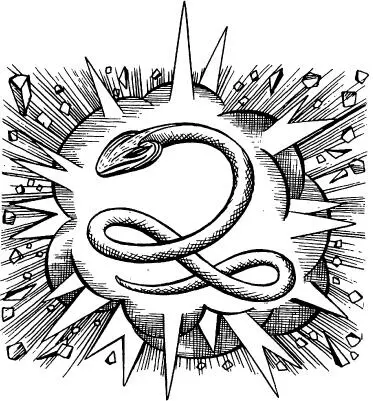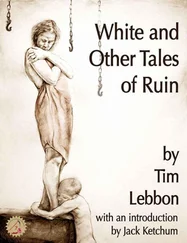“Dear, I…I’m terrified,” says Mrs Dear.
Her husband says tenderly, “It’s a bad business, dear, but I’m sure we’ll pull through somehow.” Then he looks to the teacher and says quietly, “Madam, I owe you an apology. This rail system is more inept, more inane, more… altogether bad than I thought possible in a country like ours.”
“You can say that again!” groans the old steam man.
“I want to get off this train,” says the child sulkily and for while they listen to the quiet rushing of the wheels.
Suddenly the teacher cries, “The child is correct! We should slow the train down and jump off it!”
She fumbles with the lock of her belt saying, “I know our speed is controlled by wireless waves or something but the motor — the thing which makes the wheels turn — is quite near us, in the traction unit, could we not…”
“By heck it’s worth a try!” shouts the fireman, fumbling at his belt, “Just let me get at that engine! Just let me get out of this … This bloody belt won’t unlock!”
“Neither will mine,” says Mr Dear in a peculiar voice. None of the seat belts unlock. The teacher says forlornly, “I suppose they call this security.” But the old steam man refuses to sit still. Pressing his elbows against the chair-back he hurls his massive bulk forward again and again, muttering through gritted teeth, “I won’t — let — the bastards — do it!”
Though the belt does not break it suddenly gives an inch then another inch as a rending sound is heard inside the upholstery.
Then somewhere a door swishes open and the driver is beside them asking smoothly, “What seems to be the problem?”
“Quick Felix!” says the old steam man, relaxing for a moment, “Get me out of this seat and into your cabin. I want a crack at the motor. I’m sure I can damage it with something heavy. I’ll shove my body into it if that will let some of us off!”
“Too late for heroics John!” declares the driver, “I cannot possibly allow you to damage company property in that wanton fashion.”
His voice is clear and cold. He wears a belt with a gun holster, and has his hand on it. He stands at ease but every line of his body indicates martial discipline. All stare aghast at him. The old man says, “You … are … insane!” and flings himself forward against the belt again but the driver says, “No, John Halifax! You are insane and I have this to prove it.”
He draws his gun and fires. It explodes with a thud, not a bang. The fireman slumps forward though his belt holds him in the chair. Mrs Dear starts screaming for help so he shoots her too. There is now a dim, sharp-smelling smoke in the air but the survivors are too stunned to cough. They stare at the driver in a way which clearly upsets him, for he waves the gun about saying testily, “I have NOT killed them! This is an anaesthetic gas pistol developed for use against civilians in Ulster, does anyone else want a whiff? Saves emotional stress. A spell of oblivion and with luck you wake up in the ward of a comfortable, crowded hospital.”
“Thank you, no!” says the teacher icily, “We prefer to face death with open eyes, however futile and unnecessary it is.”
The chiming sounds and the familiar voice announces that this is Captain Rogers speaking, that three and a half minutes remain before impact, that Captain Rogers should proceed immediately to the guard’s van. With a touch of his earlier, gentler, apologetic manner the driver says goodbye, and explains he is forced to leave them because someone must survive the wreck to report it at the official enquiry. The mother cries, “Oh sir, please unlock Patsy and take him with you, she’s only a little child …” but Patsy screams, “No Mum, I’m staying with you Mum, he’s nasty nasty nasty!” so the driver says quickly, “Goodbye good people,” and leaves.
When the door snaps shut behind him the mother says in a kind, careful, trembling voice, “You know The Lord Is My Shepherd, Patsy. Let’s say it, shall we?” and together they murmur, “The Lord is my shepherd. I shall not want. He maketh me to lie down in green pastures. He leadeth me beside the still waters …”
With a clang of metal sheeting the windows are blotted out by shutters.
“Pitch, pitch dark,” says Mr Dear, “They haven’t even allowed us light.”
He is clasping his wife’s body so that her unconscious head rests upon his shoulder, and he finds some comfort in this pressure.
“I know it is a small mercy,” says the voice of the teacher, “But I’m glad that military band no longer sounds.”
In the darkness the throbbing of the train wheels is more audible and the mother and child pray louder to be heard above it, but not much louder. They reach the end of the prayer, start again at the beginning and continue reciting till the very end.
“Do you remember,” says the teacher suddenly, “When every carriage had a communication cord that any traveller could pull and stop the train?”
“Yes!” says Mr Dear with a noise between a groan and a chuckle, “Penalty for improper use £5.”
“Once upon a time every small boy wanted to drive a train when he grew up,” sighs the teacher, “And in rural communities the station-master played a rubber of whist on Sunday evenings with the schoolmaster, the banker and the local clergyman. I remember a bright spring morning on the platform at Beattock. A porter took a wicker basket from the guard’s van and released a whole flight of carrier pigeons. I remember signal boxes with pots of geraniums on the sills.”
Mr Dear sighs and says, “We had a human railway once. Why did it change?”
“Because we did not stick to steam!” says the teacher firmly, “We used to be fuelled by coal, our own British coal which would have lasted us for centuries. Now we depend on dangerous poisonous stuff produced by foreign companies based in America, Arabia and …”
“You’re wrong,” says Mr Dear, “These companies aren’t based anywhere. I’ve shares in a few. The people running them have offices in Amsterdam and Hong Kong, bank accounts in Switzerland and homes on several continents.”
“So that is why we are driven from outside,” cries the teacher, getting excited, “None of US is in charge of us now.”
“Some of us pretend to be.”
They hear the faint distant scream of an approaching train siren. It swells so loud that the teacher is forced to yell over it, “But nobody is really in charge of us now! Nobody is in charge of us…”
She has braced herself for an explosion, but does not hear one, or hears and forgets it immediately. The train is no longer moving. The blackness enfolding her is so warm and snug that for a moment she dreams she is at home in bed. When she hears the voice of a child calling drowsily, “Mummy … Mummy …” she almost believes it is her own. The voice of a mother answers on a wondering note, “I think — Patsy — we’re going to be all right.”
A moment later the teacher, like other passengers on that train, hears the start of a truly huge and final explosion, but not the end of it.

Mister Meikle — An Epilogue
At the age of five I was confined to a room made and furnished by people I had never met and who had never heard of me. Here, in a crowd of nearly forty strangers, I remained six hours a day and five days a week for many years, being ordered about by a much bigger, older stranger who found me no more interesting than the rest. Luckily the prison was well stocked with pencils and our warder (a woman) wanted us to use them. One day she asked us what we thought were good thing to write poems about. The four or five with opinions on the matter (I was one of them) called out suggestions which she wrote down on the blackboard:-
Читать дальше













